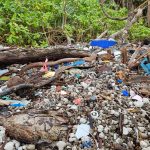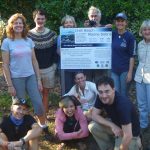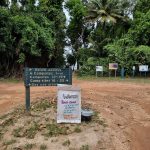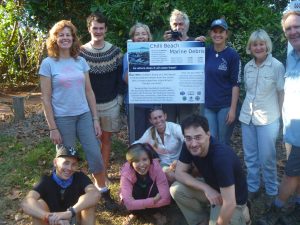Chilli Beach Interpretive Sign SRP
Source Reduction Plan (SRP) Overview
Name of SRP
Partners Delivering the SRP
- Tangaroa Blue Foundation – created, delivered and led the SRP
- Northern Kuuku Ya’u Land and Sea Rangers
- Northern Kuuku Ya’u Kanthanampu Aboriginal Corporation RNTBC Land Trust –
- Queensland Parks and Wildlife Services (QPWS)
- Cookshire Council
- The Aboriginal Traditional Owners of Kutini-Payamu (Iron Range) National Park (Cape York Peninsula Aboriginal Land) are the Kuuku Ya’u people (including the Kungkay people and Kanthanampu people).
Location
Chilli Beach Camping Area, Lockhart (Cape York), QLD 4892
Kutini Payamu (Iron Range) National Park (CYPAL)
Photo 1
Evidence of the issue

Photo 2
Evidence of SRP resources

Photo 3
Evidence of positive outcomes

Overall Goals & Background
Targeted Debris
Marine Debris on Chilli Beach
Why is the SRP needed?
The Tangaroa Blue Foundation identified Chilli Beach in Far North Queensland as a marine debris hotspot, with approximately 5 tonnes being removed every year.
Educational signage can be a great way to pass on knowledge, especially in areas where there is a lack of information. The language, style, and size of an interpretive sign are important to consider, it needs to be easily understood, engaging, and informative.
Logistics
Timeline and Project Goals
This source reduction plan was implemented in 2018
The goal of this SRP was to install a marine debris informational sign at the beach explaining that the site is a hotspot and impacted by marine debris washing in from both international and domestic sources, but very little from the local area.
Rangers are also equipped with clean-up bags enabling people to carry out beach clean-ups during their stay. Participants are asked to inform the rangers of the weight collected and to return the bags; they can also input their data directly into the Tangaroa Blue Foundation’s AMDI online database.
Measuring Success
Educational signage can be a great way to pass on knowledge, especially in areas where there is a lack of information. The language, style, and size of an interpretive sign are important to consider, it needs to be easily understood, engaging and informative.
This SRP is aimed to educate and prompt visitors and campers at the Chilli Beach campground to participate in removing any marine debris they may find on the beach and surrounding areas.
Engaging the community and the Northern Kuuku Ya’u Land and Sea Rangers to work together and initiate conversations around marine debris. Engaging the rangers and visitors to learn about the Australian Marine Debris Initiative (AMDI) database and contribute to valuable data collection.
Data Collection & Reporting
It is recommended that visitors collect marine debris using the clean-up bags provided by the Rangers, or can use their own. To advise the rangers of the weight of rubbish collected so this can be entered into the AMDI database by the Rangers or the visitors themselves.
Results and Reflections
Positive Outcomes
By facilitating data collection and access to the AMDI database, everyone involved can make valuable contributions to addressing and understanding marine pollution.
Funding
Challenges & Improvements
Future Opportunities
The Chilli Beach Interpretive Sign remains at the location and alongside regular beach clean-ups, Tangaroa Blue is seeing huge amounts of debris being removed each and every year.

